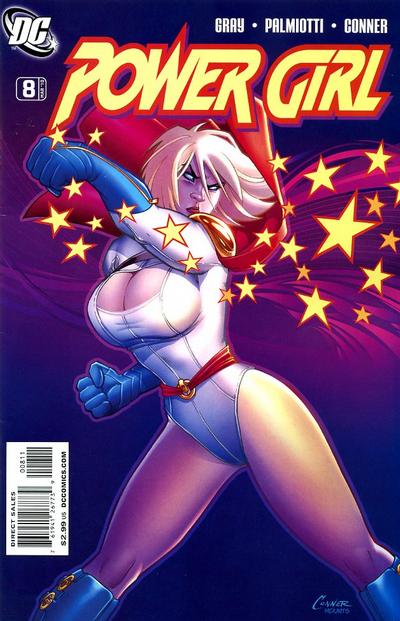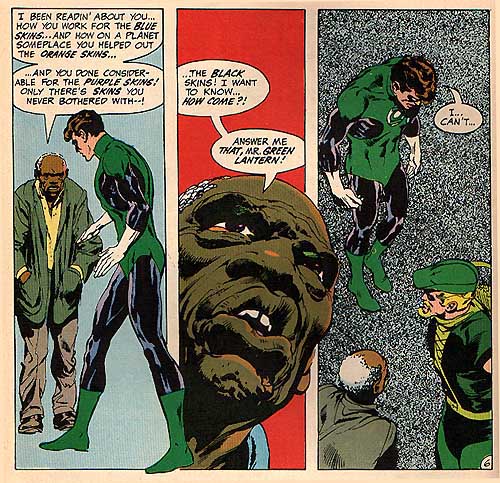While
browsing through a gallery of cosplayers from New York Comic Con I found a
particular picture of a woman dressed as Emma Frost, and while she most
definitely pulls off the costume much better than I could, it drew my eye to a
problem that comics have had for decades.
How we
portray women in most superhero comics could be, at best, described as
juvenile. And while like most red-blooded, red-meat-eating American Men I enjoy
looking at attractive ladies, I always get this weird feeling like the writer/artist/director
is sitting next to me saying “Hey yo man check out that girl’s ass”.
There’s
been a rumor floating around for years that artists/writers would slowly
increase the size of Power Girl’s breasts each issue to see if anyone noticed.
Power Girl is a really good example of a woman drawn for men, by men, and the
amount of creepy things found when Googling her is a reason to avoid doing so.
It was hard to find a way to describe her without sounding creepy, so I’ll
allow Wikipedia to do it whilst I clear my search history.
“The
character is consistently depicted as a large breasted young woman, and her
physique is one of her most recognizable attributes—-to the extent that various
writers have acknowledged it in both serious and humorous ways.”
There
is a really good quote she has on her ridiculous “cleavage window” that goes
like this. [the costume "shows
what I am: female, healthy. If men want to degrade themselves by staring,
that's their problem, I'm not going to apologize for it."
That’s
all well and good, and more power to her for her convictions, but the fact is
that she’s a comic book character and the men staring at her aren’t feeling
like they’re degrading themselves. The men who drew her weren’t thinking about
sending a message of strength or something like that, but something more along
the lines of what will sell to comics’ premier demographic.
It
seems like it’d be hard to be a girl and be a fan of superhero comics. If
you’re a 10-13 year-old girl who likes superheroes, what are you reading? This
is a legitimate question and if there is an answer I’d love to hear it. If nothing is being written for you, then
what are you going to read? If you’re not reading, then who will be writing in
the future? Comics are already a boys club, and it might be nice to have more
women writers on staff to explain why showing Batman and Catwoman in a
thoroughly unpleasant sex scene or making Starfire a skank was a really bad
idea.
I’m
a firm believer that comics are for everybody. I don’t mean that every comic
should be for everyone, but I do believe that there should be a comic out there
for anyone who wants to read them. When I look at mainstream titles I find
myself wondering what isn’t being written for 14 year-old boys or people who
are already ardent fans. The people reading comics now will be the ones writing
them in a few years, and what they read will have a profound impact on what
they create. If all we show them is this I can’t help but be a bit afraid for
the future of the mainstream superhero comics.
If
you’re going to have women heroes and villains, get some female writers. It’s
really that simple. There is one man who can write women well, his name is Joss
Whedon, and he’s busy with Avengers
stuff so find someone else. There are many talented female writers and artists
out there who would love the opportunity to write one of their heroines, so
maybe instead of giving Geoff Johns another book give one of them a chance.
All
I’m really saying in all this, and what I say in pretty much everything I
write, is we need to stop writing for adolescent boys. We need to write for
everyone if to grow our market and
make something people will love. This doesn’t just apply to comics but to games
as well. Look at almost any fighting game and how they portray women. You can
say it’s supposed to be funny until it actually is, but it doesn’t change the
fact that it’s incredibly creepy.
If
we keep designing things for fourteen year-old boys then we’ll end up only
having Rob Liefield, Michael Bay, and Call
of Duty and that’s an incredibly bad thing. By adding in new creators and
new perspectives we grow as a medium and as a culture rather than continuing to
stagnate like I’d argue we are. If we
want to keep degrading ourselves further, then steady on.


